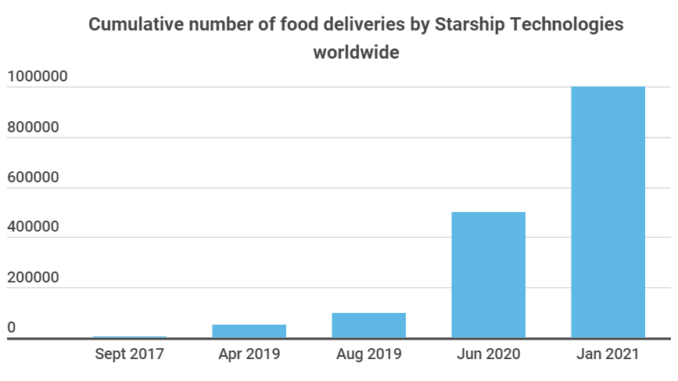
Technological innovations are currently going hand in hand with changing consumer lifestyles and consumption habits: food-delivering city robots, meat from 3D printers, vertical food farms in big cities and increasingly health-conscious citizens. A new infographic from Block-Builders.de sheds light on disruptive changes to the food sector.
Grocery deliveries are booming – especially during the pandemic. However, recently meals are sometimes delivered by robots. By January 2021, the start-up Starship Technologies had already delivered one million meals – an increase of 1,900% compared to April 2019. It is now possible to order food to be delivered by robots in Hamburg, among other places.
So-called in vitro meat also has the potential to turn the food industry on its head. Discussions about lab-grown meat have been going on for some time, but the concept seems to be getting closer and closer to market maturity. Before the end of 2021, numerous restaurants in Germany are expected to be stocked with meat produced by 3D printers. As the infographic shows, the term ‘in-vitro’ meat remains a foreign word for 60% of German citizens, who are not familiar with the term. However, there is much to be said for the technology’s broad application, not least the scarcity of arable and pasture land.
Limited Options
71% of the earth’s surface is covered in water. Since deserts, mountains and forest areas also significantly constrain the space available for agricultural use, so-called urban farming could play an important role in the future. Vertical farms also enable significant food production within urban centres.
Risk-taking investors stand to profit handsomely from this shift. Manufacturers of meat substitutes (e.g. Beyond Meat) as well as urban farming companies (e.g. AeroFarms) could be among the big winners of the future.
Nutrition and Corona
Meanwhile, the study shows that the pandemic has had a major impact on food consumption in Germany. There has overall been a trend towards healthier diets. 23% of Germans say they have been eating more fresh fruit and vegetables since the outbreak of the crisis. Just 5% of citizens reported consuming less fresh produce since the beginning of the pandemic. Junk food has also fallen out of favor.
The world is changing – and the food industry, which has long been described as conservative, is not being spared, far from it. New technologies have not only transformed the way food is produced, but also the way it is sold. This could benefit not only the environment, animals and human health, but also those who have recognised the potential of the industry in time and invested.
Leave a Reply